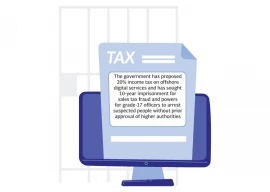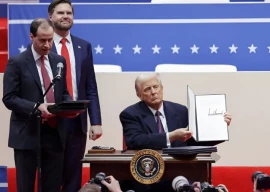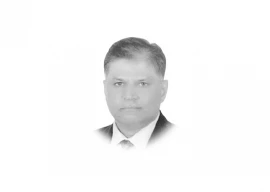
Lawmakers on Tuesday feared that money would fly out of Pakistan, economic growth would suffer and many jobs would be lost due to proposed restrictions on ineligible persons and the informal sector, but the government instantly dismissed such assertions.
Members of the National Assembly Standing Committee on Finance described amendments to tax laws as "draconian", aggressive and tantamount to empowering taxmen who were not credible. "Money will fly elsewhere, if the government tries to clamp down on the informal economy," remarked Committee Chairman Syed Naveed Qamar.
It is no easier to channel money to Dubai or elsewhere because these destinations now also generate suspicious transaction reports (STRs), said Ali Pervaiz Malik, Minister of State for Finance and Revenue.
The government has introduced the Tax Laws Amendment Bill in the National Assembly to suspend bank accounts of unregistered businesses, bar their transfer of properties, arrest people involved in tax fraud without prior approval of higher authorities and put them on the Exit Control List (ECL). It has also proposed that ineligible people cannot buy a home and car or maintain bank accounts. The sudden transition from zero to 100 will cause huge pain to the people and this pain will continue throughout the tenure of this government, said Naveed Qamar.
"I know there will be repercussions for the economy," admitted Ali Pervaiz Malik. Almost all members of the standing committee questioned whether the government had assessed the impact of those restrictive measures on the economy and jobs. However, no government official could give a satisfactory response. Naveed Qamar said that the performance of the Federal Board of Revenue (FBR) was pathetic and with such aggressive measures people would not invest in Pakistan.
Former foreign affairs minister Hina Rabbani Khar described the proposal to suspend bank accounts as "draconian". "Has anybody assessed the impact of these proposals on jobs and economic growth," asked MNA Javed Hanif Khan.
There will be ripple effects of measures to correct 50 years of wrongdoing in a week, remarked MNA Mirza Ikhtiar Baig. But FBR Chairman Rashid Langrial said that all those measures would be gradually implemented after approval of the law.
The government has been unable to broaden the tax base despite introducing the concept of non-filer and seeking powers to disconnect electricity, gas and telephone connections. Now, it has come up with a new terminology - "ineligible person". "I concede that the non-filer status should not have been used as a tool to collect revenue and this reflects the failure of the institution," admitted the state finance minister.
The proposal to ban transactions by ineligible persons will be the biggest tool to make Rs9 trillion worth of money in circulation useless, he said.
"Do you think that your current system and people are accountable and credible and these new powers will not be used by them to extract money from taxpayers," asked Hina Rabbani Khar.
Rashid Langrial said that the FBR on Tuesday rolled out five new shades of taxmen and they were categorised from A to E. A-category tax collectors will get four salaries in reward, he said.
"The taxation system is based on rent-seeking, is coercive and dodgy," said Khar. There is huge corruption in the FBR but today imported goods are cleared without paying speed money and clearance time has been reduced from 106 hours to a mere 18 hours, said the FBR chairman.
"We must go after the untaxed, under-taxed and make sure there is an element of accuracy in filing income tax returns," said Ali Pervaiz Malik. There are 300,000 industrial electricity connections and less than 25% are registered with the FBR, said the FBR chairman.
Parliament has already authorised the FBR many years ago to cut off electricity connections of unregistered persons, but it could not use those powers.
"We are of the view that until and unless a buyer has sufficient resources to make major purchases, he should not have the right to buy a property or a car," said Langrial. He added that inflation-adjusted tax collection in years 2008, 2016 and 2024 was the same despite an increase in the minimum income tax rate from 5% to 15%, increase in rates for the salaried class and raising sales tax rates.





1737501233-0/mlk-(1)1737501233-0-165x106.webp)







1737452260-0/Gaddafi-stadium-(2)1737452260-0-270x192.webp)










COMMENTS
Comments are moderated and generally will be posted if they are on-topic and not abusive.
For more information, please see our Comments FAQ